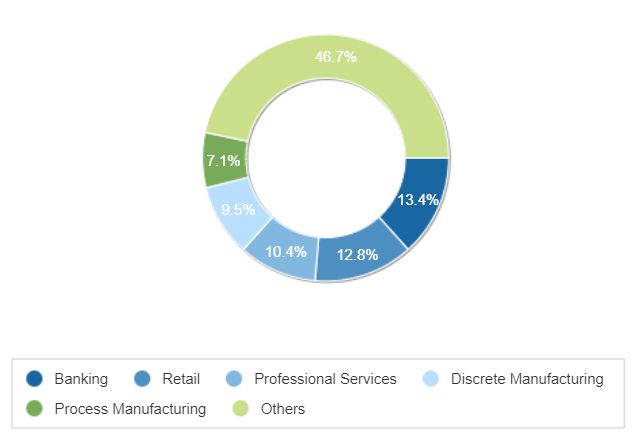IDC: Global Spending on AI to Reach $154 Billion in 2023

In Brief
AI spending is expected to reach $154 billion in 2023, an increase of 26.9% from last year.
This growth is driven by the increasing demand for AI-powered solutions across various industries, such as healthcare, finance, and transportation.
The majority of AI spending will come from the US, with a 50% share of the total, and Western Europe will account for 20% of AI spending.
As artificial intelligence (AI) continues to grow in popularity, so does the amount of money being poured into its development. According to International Data Corporation (IDC) forecast, global spending on AI technologies is expected to reach a whopping $154 billion in 2023. This 26.9% increase from the previous year is being driven by the increasing demand for AI-powered solutions across various industries. The adoption of AI is expected to enhance efficiency, productivity, and decision-making processes in these sectors.

Much of this spending will go towards developing chatbots, referrals, and sales applications, which are predicted to account for more than 25% of all AI spending this year. However, it is important to note that this is just the beginning, as IDC expects spending on AI technologies to amount to a staggering $300 billion by 2026. This will likely be caused by the increasing demand for automation and efficiency across various industries. As more companies adopt AI technologies, we can expect to see significant advancements in areas such as healthcare, finance, and transportation.
Many experts believe that AI holds the key to solving some of the world’s most pressing problems, from climate change to disease. Others believe that AI will simply make our lives easier by taking on mundane tasks and freeing up our time for more important pursuits.
Whatever the reason, there’s no doubt that AI is here to stay. So if you’re thinking about investing in AI, now is the time to do it. With the right technology, you could be on the cutting edge of the next big thing.

IDC forecasts that the majority of AI spending will come from the US, with a 50% share of the total, while Western Europe will account for more than 20% of AI spending. Banks and e-commerce companies will be the biggest AI spenders, followed by the media industry. This growth is driven by the increasing demand for personalized content and targeted advertising. As AI technology continues to advance, media companies are expected to invest heavily in this area to remain competitive.
The rapid growth in AI spending is indicative of its increasing adoption across sectors. AI is being used for tasks like customer service, content creation, and targeted advertising. In the future, AI is expected to play an even bigger role in our lives, with many predicting that it will eventually surpass human intelligence.
- The UK government has launched a £370 million plan to transform the country into a leading ‘AI&Tech superpower‘ by 2030. The plan focuses on providing world-class digital infrastructure, unlocking the value of data to create growth, innovation, and societal benefits, and harnessing digital transformation to build a more inclusive, competitive, and innovative digital economy. The Prime Minister and Technology Secretary announced the government’s plan to ensure the UK’s place as a science and technology superpower.
- Soci has raised $120 million in funding to enhance its artificial intelligence capabilities for digital marketing. This funding round brings the company’s total funding to nearly $240 million and will be used to enhance its AI capabilities, mergers and acquisitions, and further international expansion. Soci aims to simplify the process of creating localized marketing campaigns across digital platforms while adhering to brand standards, optimizing local search, and integrating data.
- AI startup Humane has raised $100 million in a Series C round led by Kindred Ventures. Existing investors Tiger Global, Valia Ventures, Qualcomm Ventures, Forerunner Ventures, Lachy Groom, and Sam Altman, founder of OpenAI, participated in the round. The company will use the fresh funding to accelerate the development of personal mobile computing driven by AI.
Read more about AI:
Disclaimer
In line with the Trust Project guidelines, please note that the information provided on this page is not intended to be and should not be interpreted as legal, tax, investment, financial, or any other form of advice. It is important to only invest what you can afford to lose and to seek independent financial advice if you have any doubts. For further information, we suggest referring to the terms and conditions as well as the help and support pages provided by the issuer or advertiser. MetaversePost is committed to accurate, unbiased reporting, but market conditions are subject to change without notice.
About The Author
Damir is the team leader, product manager, and editor at Metaverse Post, covering topics such as AI/ML, AGI, LLMs, Metaverse, and Web3-related fields. His articles attract a massive audience of over a million users every month. He appears to be an expert with 10 years of experience in SEO and digital marketing. Damir has been mentioned in Mashable, Wired, Cointelegraph, The New Yorker, Inside.com, Entrepreneur, BeInCrypto, and other publications. He travels between the UAE, Turkey, Russia, and the CIS as a digital nomad. Damir earned a bachelor's degree in physics, which he believes has given him the critical thinking skills needed to be successful in the ever-changing landscape of the internet.
More articles

Damir is the team leader, product manager, and editor at Metaverse Post, covering topics such as AI/ML, AGI, LLMs, Metaverse, and Web3-related fields. His articles attract a massive audience of over a million users every month. He appears to be an expert with 10 years of experience in SEO and digital marketing. Damir has been mentioned in Mashable, Wired, Cointelegraph, The New Yorker, Inside.com, Entrepreneur, BeInCrypto, and other publications. He travels between the UAE, Turkey, Russia, and the CIS as a digital nomad. Damir earned a bachelor's degree in physics, which he believes has given him the critical thinking skills needed to be successful in the ever-changing landscape of the internet.






















































